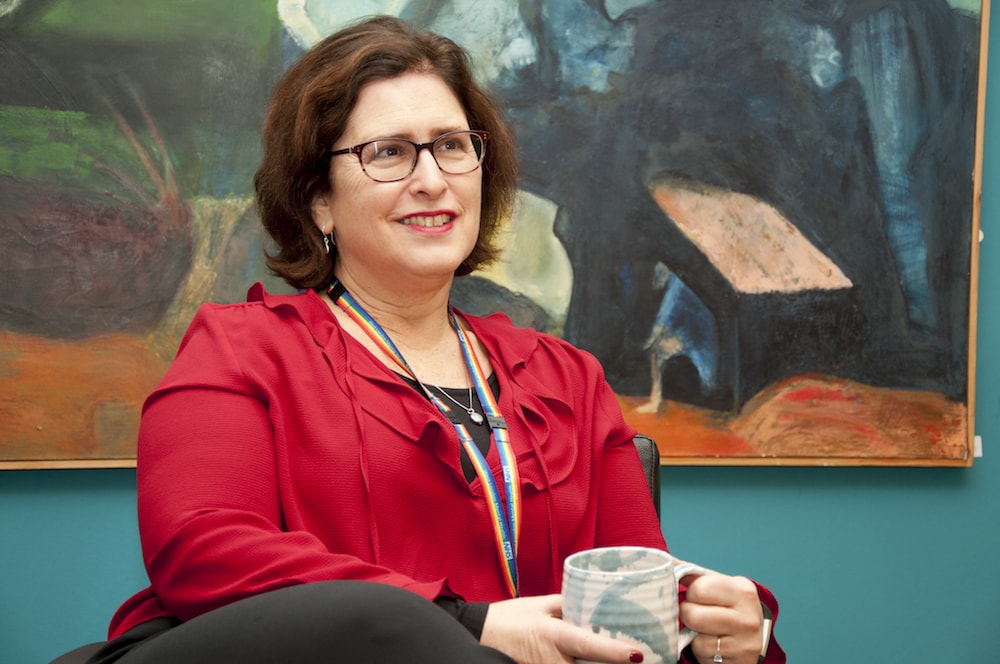Carolyn Regan: The Mental Health Trust CEO Redefining the Status Quo
updated on May 8, 2018

Each year the Financial Times lists 100 of the most influential LGBT+ leaders and allies who are creating supportive spaces for their employees. With more than 40 years of tackling stigma and discrimination behind her, Carolyn Regan was a worthy addition to the 2017 OUTstanding list, and as CEO of the West London Mental Health Trust (WLMHT), she’s transforming services to provide an open, caring space for all staff and patients. We caught up with Carolyn to find out about LGBT+ visibility in the workplace, the power of art therapy, and the future of Broadmoor Hospital
Congratulations on your OUTstanding award. How did it feel to receive that?
It was a privilege. As someone who is proudly waving a rainbow flag for the LGBT+ community, this is a very personal achievement for me. I want to ensure that our staff feel safe and comfortable, and as someone who is also out and proud (and has been for a long time) it was a real honour, and I feel truly humbled to be recognised.
If you could pick one thing that you’re most proud of, what would it be?
I’m a gay parent, and exceptionally proud of my two children.
And does that experience as a parent influence your work?
Yes. For 30 years, I’ve supported other gay parents working in the NHS and the public sector.

Carolyn Regan
What practical steps do you take to ensure diversity at your trust?
I’ve been working to challenge prejudice for the last 40 years. I’m really proud of mentoring schemes for candidates from BAME backgrounds, and 50% of our staff come from BAME backgrounds, which reflects the local population.
We want to create an environment that welcomes people from all backgrounds. This is why we’ve put in place mandatory training for all senior staff to make sure that, when recruiting to a senior post, they are aware of how unconscious bias can occur and manifest itself in the process. It’s making a real difference to our staff appointments.
Can you tell us about the WLMHT’s ‘LGBT+ Champion’ initiative?
I launched the Trust’s first-ever LGBT+ Champion initiative in February last year. Our LGBT+ Champions are staff volunteers who are committed to creating a safe and inclusive space for all. They focus on supporting any staff or patients who might experience discriminatory behaviour.
LGBT+ Champions wear rainbow-coloured lanyards. What effect does that have?
They help create a culture of openness and transparency, whereby staff, patients and their carers can speak comfortably and without fear of judgement. The initiative has proved very popular, with many staff sporting the lanyards and supporting LGBT+ issues. For example, staff have joined the London Pride event for the last two years – and we will be taking part again this year.
You’re obviously doing a lot to help others. But throughout your career, have you felt supported as an LGBT+ person?
Yes, mostly. There’s been some negative comments in the past, but over time more people are becoming open and welcoming to those who identify as LGBT+.
Our LGBT+ Champions are staff volunteers who are committed to creating a safe and inclusive space for all
Why is it important to have LGBT+ visibility in the workplace?
The LGBT+ community has been in the shadows for long enough. LGBT+ visibility is needed so that we can celebrate the wonderful diversity that exists in our community.
It’s important that we work alongside peers who identify as LGBT+ so that we can try to understand their story, reduce stigma and promote inclusion further. In turn, our staff will be able to better serve patients who might be LGBT+ too.
Is this particularly important in a mental health trust?
Mental illness affects the LGBT+ community greatly, and some research suggests that they’re more likely to have mental health problems, often linked to experiences of discrimination and bullying. When patients see a member of staff with a rainbow lanyard, we hope that they’ll be more open with us, and that this helps us to provide better care.

You offer art therapy – what makes that service so effective?
Art therapy is used to help people communicate when they find it difficult to say how they feel. Sometimes, people aren’t good at talking, but if they are offered an alternative form of therapy, like art therapy, it can reduce stress and may help them open up.
Art therapy is a powerful way of focusing on the whole person, not just the symptoms of a person’s mental illness. Sometimes, it can help the therapist to identify underlying or suppressed issues and emotions.
At Broadmoor Hospital, some of our patients’ art has been displayed on the wards. We feel this gives the patients a sense of pride and purpose.
WLMHT manages Broadmoor Hospital, in Berkshire, which is often talked about as a mysterious, scary place, and mistaken as a prison. Why do you think that has happened?
I think in part this is due to the Victorian buildings. Another issue is that we care for patients who have previously offended, and some are high-profile, which means that if Broadmoor is discussed in the media, these individuals and their images are used.
But perhaps the biggest reason is that the media are only just starting to change how they talk or write about mental health. The stigma around those with a mental illness has contributed significantly to Broadmoor being seen as a prison that incarcerates those who are “insane” or “crazy”.
The stigma around those with a mental illness has contributed significantly to Broadmoor being seen as a prison that incarcerates those who are ‘insane’ or ‘crazy’
We are not a prison, and we are very clear that anyone under our care at Broadmoor Hospital is a patient. As one of only three high security mental health hospitals in England, Broadmoor Hospital plays an important role in providing an effective and secure facility for the specialist treatment of patients with severe mental illness or personality disorder.
What services does Broadmoor Hospital offer?
Broadmoor offers much in the way of therapeutic activities for patients and we are focused on their recovery. Social interaction is very important, to make sure patients remain engaged in their treatment and to prevent them from becoming withdrawn.
In fact, our latest figures show that the vast majority of patients are now offered 25 hours or more of therapeutic activities per week. Our services include activities that are designed to support each patient’s recovery path – these may be educational, vocational, arts, sports or social activities.
We’re in the process of constructing a new, purpose-built hospital, which will replace the outdated Victorian buildings. The redevelopment will have a major positive impact on patients, staff, services, and quality of care.

What can we do to put an end to the damaging misconceptions about Broadmoor?
It’s important to remember that those under our care at Broadmoor are patients being treated for mental illness. Many patients have themselves been victims of violence and abuse, and our job is to treat the person, not punish the act.
The media should be more mindful about the use of language which can often be insensitive and perpetuates stigma and fear around mental illness. Images that depict outdated treatment methods are constantly used. Stigmatising pictures can be as damaging as words when used to illustrate stories about mental health.
How do people access the services offered by WLMHT, and trusts like it?
If you’re experiencing mental health problems for the first time, and think that you might need treatment, you should speak to your GP, who will be able to refer you to the appropriate services.
If you already use our services, you can call our 24/7 Helpline on 0300 1234 244 for help from trained mental health professionals around the clock.
Please look on our website for more information about all the services we provide: wlmht.nhs.uk

